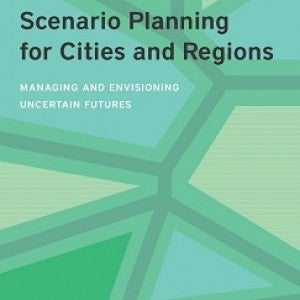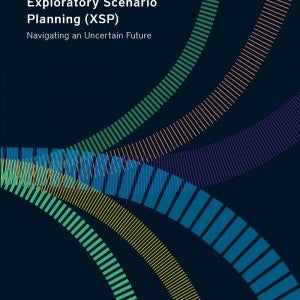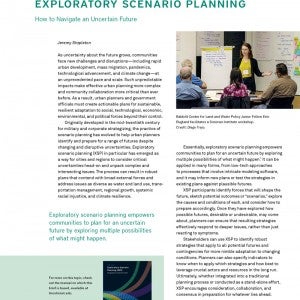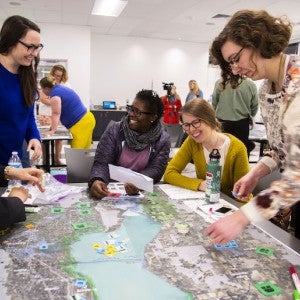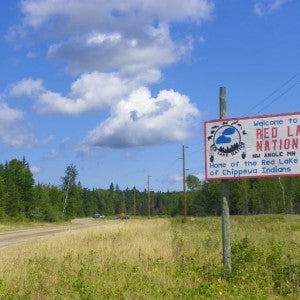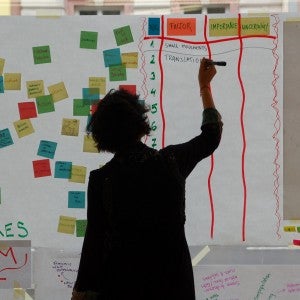As part of our mission to equitably advance the field, the Consortium for Scenario Planning hosts a variety of publicly available resources on scenario planning’s history, practice, and future. To request or recommend an addition to this library, contact us.
2022 Request for Proposals Projects: Scenario Planning and Changing Food Systems
Projects funded through the 2022 Consortium for Scenario Planning RFP cycle focused on the use of scenario planning to enhance community food system resiliency. Around the world, the landscapes and systems that grow and provide our food are threatened by climate change, resource depletion, economic crises, and over- (or under-) development, among other stressors. Through this request for proposals, the Lincoln Institute commissioned projects that apply scenario planning to anticipate these forces and to plan for their effects on various communities. These communities included regions where external forces (such as climate change, the COVID-19 pandemic, or economic uncertainties) threaten the viability of agriculture; areas that support vital commercial agriculture; areas with a healthy or limited local food supply; communities that wish to encourage the growth of family or small-scale farming; or urban and rural areas that struggle with food accessibility.
Projects
Exploratory Scenario Planning with Multi-Stakeholder Platforms in Food Systems: A Toolkit
Angela R. Hansen and Eilif Ronning, Food Systems Foresight
Planning for Sustainable Food Systems: A Scenario Planning Toolkit
Kristi Taebe and Kaelan Watson, Kwantlen Polytechnic University’s Institute for Sustainable Food Systems
Land, Foodways, and Kinship in Sites of Territorial Conflict: The Case of the Palestinian Villages
Gabriel Cuéllar and Athar Mufreh, Cadaster
Growing a Community Food Vision: A Scenario Planning Toolkit for Rural Community Food System Planning
Catie DeMets and Jules Reynolds, University of Wisconsin-Madison
National Young Farmers Coalition: Exploratory Scenario Planning Toolkit
Emma Walters and Arnab Chakraborty, University of Illinois at Champaign-Urbana
Abordando la problemática del Sistema alimentario en Lima: A Guide to Apply Exploratory Scenario Planning
Gabriela Rengifo Briceño and Carolina Zegarra Tipismana, Alimentando el Futuro
2021 Request for Proposals Projects: Scenario Planning and Climate Change
Projects funded through the 2021 Consortium for Scenario Planning RFP cycle focused on the use of scenario planning to advance climate-related goals. The extent and nature of climate change are tremendously uncertain, and decision makers must anticipate the impacts of a changing climate and prepare for a decarbonized economy. In contending with far-reaching but varying localized effects, scenario planning can help cities and regions prepare and plan for this uncertain future while also considering factors like demographics, housing, transportation, water and air quality, technology, and equity that affect a community’s ability to manage climate change impacts and still achieve long-term goals.
Projects
Scenario Planning Using Climate Data: New Tools Merging Science and Practice
Donovan Finn and Naomi Miller, Stony Brook University
An Urban Planner’s Guide to Climate Information
Ellie Evans, Donovan Finn, and Kevin A. Reed, Stony Brook University
Using Green and Blue Infrastructure for Urban Flood Mitigation: Simulating Scenarios for Climate Change, GBI Technologies, and Land Policy
Nilo Nascimento, Federal University of Minas Gerais, and Renan Pereira Almeida, Federal University of São João del Rei
Exploratory Scenario Planning for Climate In-Migration: A Guide for Cities in the Great Lakes Region
Nicholas B. Rajkovich, University at Buffalo, and Terry Schwarz, Kent State University
What Do We Do with the Land Left Behind? XSP for Floodplain Buyout Parcels
Risa Hiser, Osamu Kumasaka, Kelly Leilani Main, and Victoria Woods, Buy-In Community Planning, with Maggie Tsang and Isaac Stein, Dept. LLC
Anticipated but Unpredictable: Exploratory Scenario Planning for Climate Migration in Cleveland/Cuyahoga County, Ohio
Terry Schwarz, Joseph Schilling, Violet Sulka/Hewes, Catherine Tumber, and Nicholas B. Rajkovich
2020 Request for Proposals Projects: Scenario Planning With an Eye Towards Equity and Shrinking Cities and Regions
A collaboration of the Consortium for Scenario Planning and the Legacy Cities Initiative, the projects funded by this request for proposals advance research on how scenario planning can help further equity goals amidst limited population or economic growth. Read this Land Lines coverage to learn more.
Projects
Metropolitan Area Planning Council
Demographic Forecasting by Race and Ethnicity: ‘Segregation Scenarios’ and Environmental Justice Analysis
Cascadia Partners
Scenario Planning in a Virtual World: A guide to Equitable Engagement for Scenario Planners
Center for a New Economy
Tracking Neighborhood Change in Geographies of Opportunity for Post-Disaster Legacy Cities
Cleveland State University and City of Youngstown
Scenario Planning in Small and Mid-Size Legacy Cities: Framework and Tool Adaptations in Youngstown, Ohio
University of Illinois at Champaign-Urbana
LegacySP: A Scenario Planning Toolkit for Shrinking Regions
City Explained
Scenario Planning for Slow-Growing Regions: A Guidebook and Case Study
Minnesota 350
Northwest Minnesota Scenario Planning: Charting a Path from Disparities to Mutual Thriving and Regional Climate Resilience (TBA)
Other Resources
Consortium for Scenario Planning Curricula Library
How to Design Your Scenario Planning Process by Janae Futrell, AICP
Scenario Planning 101 (Self-paced online course)
APA's Urban Air Mobility PAS QuickNotes 91
Every scenario planning project is unique, but exploring how others have handled the process can be instructive in hiring consultants and creating future workshops. The cases below detail sample scopes of work used to drive successful scenario planning processes in different contexts.
Sample Scope 1: One Day Workshop Introduction to Exploratory Scenario Planning
Sample Scope 2: Developing a Smart City Roadmap
Sample Scope 3: Stakeholder Outreach for Climate Emergency Planning
